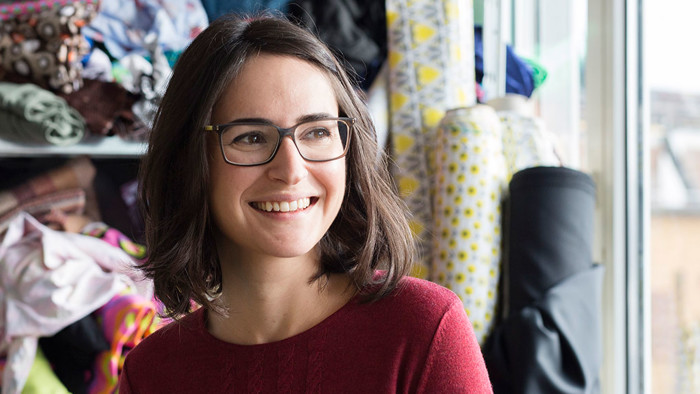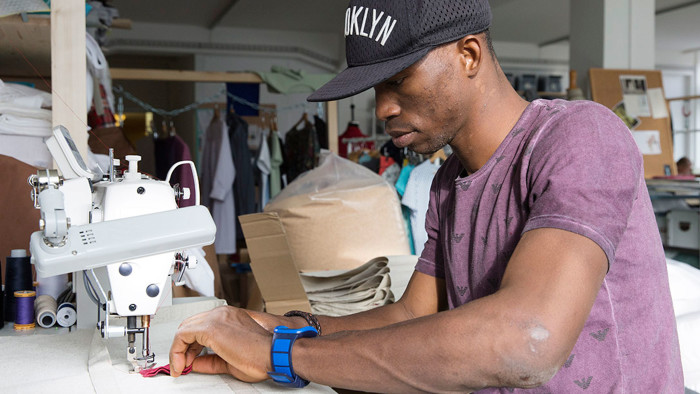MBA graduate makes a material difference in sustainable fashion

Simply sign up to the Sustainability myFT Digest -- delivered directly to your inbox.
Looking back, Megan McGill suspects she was always cut out for a career in the sustainable fashion industry — but she took a circuitous route.
She remembers tagging along as a young girl to the chain of shops her single mother managed around Mobile, Alabama, when no babysitter could be found. She would sit in the back rooms and finish her homework, or help out bagging clothes at the counter. For a while clothing stores were almost a second home, before the family moved to Switzerland in 1999, when McGill was 13 and her mother remarried.
In 2014, and after working for four years in information technology and compliance in Zürich, McGill was approaching 30 and feeling stuck. Her goal had been to work to improve the environment. She had, after all, earned a distinction in her masters in environmental technology, with a focus on pollution management, at Imperial College London.
But her work visa in London expired and she ended up at a consultancy in Zürich advising companies in the financial sector on US tax regulations. But rather than despair, she formed a plan.
First, she joined GreenBuzz, a network that connects professionals working in sustainability. She met the founder of Social Fabric, a community-based group that promotes sustainable clothing while working with refugees in Switzerland.

McGill joined the group, but becoming active in the field meant learning new skills, such as sewing. For her 30th birthday, she invited friends to Social Fabric to make upcycled pillow cases. It was a BYOM party — bring your own material.
Next, she enrolled on the University of St Gallen’s MBA programme. Why, with her qualification from Imperial College, would someone seeking to work in sustainable fashion enrol on an MBA? McGill says she wanted to brush up her skills and get a job.
Graduates of the university, HSG, as it is known for short, value it for its high placement rate: 86 per cent of its MBA students find jobs within three months of graduation.
“They have a summer internship and you can use that to get through the door of a company you want to work with,” McGill says. In her case, she had her eye on the C&A Foundation in Zug, near Zürich. Founded in 2011 by the European fashion chain, the foundation provides grants to organisations that are seeking to improve working conditions and make the textile industry more environmentally friendly.
Foundations, McGill says, can be flexible in terms of the risks they take in research. A corporate foundation such as C&A allows McGill to stay close to a company in the sector while still testing new models and ways of doing business.
The St Gallen MBA allowed her to spend three months studying the feasibility of a “circular economy”, where materials are kept in the economy for as long as possible or returned to nature — a topic she had first delved into at Imperial College.
“I decided to go to HSG because I realised some skills were missing, particularly around finance and strategy, which I think are fundamental skills every person should have.” Also, she adds, “I was trying to be strategic.”

McGill is a determined woman, dressed in tailored wool trousers belted at the waist, topped with a red sweater. Everything she wears is made from natural fibres, although a casual observer might not realise this. She does not fit the stereotype of an environmental activist.
This was important to McGill: her goal was to work on sustainability and improve the environment but to do so within the business community. That is why the MBA was so important. “If you are trying to change something, you need to understand how it operates,” she says.
One lesson McGill took from the MBA was that improving the environmental footprint of a company must be done on the basis of sound business practice. It is hard to do good, she says, if a project is not viable. “I now understand business cases and financial models, so now when we are looking at potential projects, we have to ask, can these scale? You need to understand the numbers behind them,” she says. “Strategy is core to what I do now.”
She pauses and adds: “Everyone wants to do good, but not everyone has the right strategy. They exaggerate the impact they think the project will have. Our job is to help them refine their idea so that it will achieve what they want it to achieve.”
McGill’s work is at the cutting edge of environmental technology in the fashion business. Her MBA thesis assessed the scalability of chemical recycling — an innovation with the potential to transform the apparel sector. The goal is to keep materials in the economy perpetually, or safely returned to nature, so clothes are not thrown away or donated after they have gone out of fashion. The process is also intended to eliminate many of the environmentally unsafe chemicals used to make clothes.
The idea is that fabrics can be broken down using a safe chemical solution into yarn which can be reused, either in clothing or other textiles such as upholstery. This begins to create the circular system.
There are still difficulties, such as how to use only environmentally safe chemistry in production — a problem the foundation is working on so that the sector can become truly sustainable. “Our vision is that fashion can be a force for good for apparel workers and consumers,” McGill says.
The C&A Foundation was so impressed with the assessment McGill made during her internship that it hired her to begin a new programme focused on circular systems. “I do believe success is a mixture of timing and hard work. The timing was right: C&A was starting to look at my topic,” she says.
Perhaps surprisingly for someone interested in sustainable fashion, McGill admits unabashedly that she has not read any of the bestsellers by Naomi Klein, author of No Logo and This Changes Everything: Capitalism vs the Climate.
She does, however, believe there is a role for activist non-governmental organisations. “They basically bring risks and issues to light. They are good at consumer engagement, but theirs is not the only solution.”
One of the first things McGill did when she joined the C&A Foundation was to secure a small grant for Social Fabric from Cofra, C&A’s holding company. Cofra allows employees to apply for money to work on projects they are involved in. So now McGill sits on Social Fabric’s board.
“I really believe business can change,” she says. “I believe they are the way we as a society will be able to change. So working with business for me is incredibly important.”
Comments